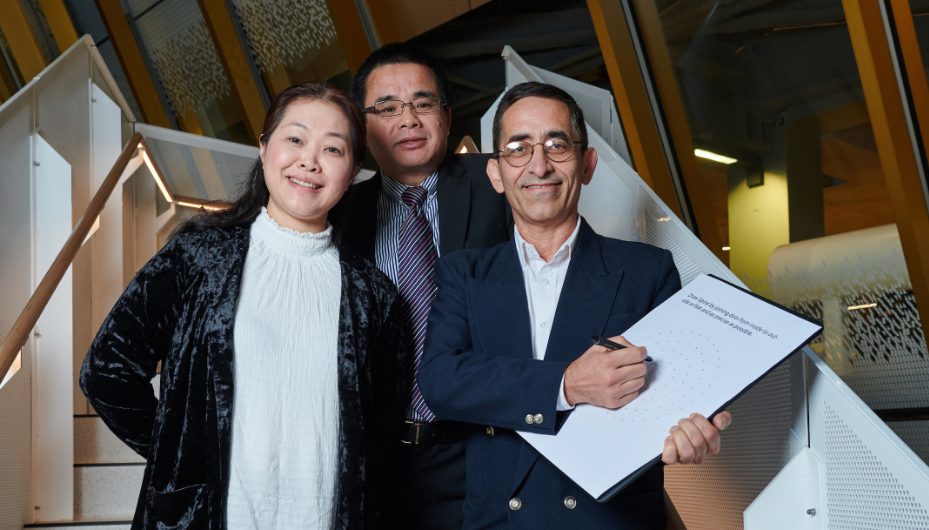Digital & Innovation
Screening tech advances early detection of Parkinson’s disease in Australia

Screening technology to catch Parkinson’s disease in its earliest stages could be available within three years, following an agreement between RMIT University and start-up company Jesse Medical.
The pioneering technology analyses the results of specialised drawing and writing tasks to differentiate between people with and without the condition.
More than 10 million people worldwide are estimated to be living with Parkinson’s disease, including over 80,000 Australians.
Many treatment options for Parkinson’s are only effective when the condition is diagnosed early but by the time patients show any commonly recognisable symptoms, many nerve cells in the brain have already suffered irreversible damage.
The new tool can spot the disease when there are no obvious symptoms and can also be used to monitor Parkinson’s patients after diagnosis, to better manage their condition.
A research agreement with Jesse Medical gives the Melbourne-based start-up exclusive rights to commercialise the RMIT-developed technology and will enable further patient trials.
Professor Dinesh Kumar said giving doctors and nurses the tools to screen for Parkinson’s would enable patients to receive treatment far earlier than ever before.
“Early detection is critical because we know that by the time someone starts to experience tremors or rigidity, it may already be too late for medication to be effective,” Kumar said. “It’s long been known that Parkinson’s Disease affects muscle control and habitual activities, so it affects how patients write and draw. Our technology translates that insight into a reliable assessment tool.”
Successful trials demonstrating the efficacy of the screening test have been published in the Journal of Biomedical and Health Informatics, Journal of Neurology and Frontiers in Neurology.
Register FREE to receive the latest news, innovations and insights from Health Industry Hub; the only one-stop-hub connecting Australia’s Pharma, MedTech and Biotech industry professionals and its key stakeholders.
Focus on dexterity: how the screening tech works
The screening test involves the completion of seven dexterity tasks on a drawing tablet, including simple writing, writing with memory load and drawing a spiral by joining dots. The test is able to create a patient-specific baseline for the different aspects of complex Parkinson’s symptoms. The data are transmitted over the cloud and customised software records the results and analyses them in real time. The software is readily compatible with existing technologies, so the only equipment needed to run the screening test is a pen, paper and drawing tablet.
The research team has refined an earlier version of the technology, which had an accuracy rate of 93%, to take into account the effects of medication on the disease. This means it can also now be used for monitoring the effectiveness of treatment and the severity of the condition.
The new technology is also able to provide more details to clinicians regarding patient symptoms.
“Parkinson’s is a complex multi-symptom disease, with individual patients exhibiting any number of these symptoms,” Kumar said.
“The standard multi-modal physical tests carried out by clinicians to monitor its progress inherently carry a level of subjectivity. “Our technology is completely objective and it’s highly sensitive for both improvements and deterioration in dexterity.”
The technology was developed by the RMIT biomedical engineering research team in the School of Engineering, which specialises in e-health and affordable diagnostic technologies.
Further patient trials are set to start in Australia and China in mid- 2020, with the technology expected to be commercially available by 2022.
You may also like From ‘feature innovation’ to ‘value innovation’ in MedTech.
News & Trends - MedTech & Diagnostics

AI-assisted colonoscopy boosts polyp and adenoma detection
MedTech & Diagnostics News: In a standard colonoscopy, as many as one-third of colorectal polyps and adenomas can go by […]
MoreNews & Trends - Pharmaceuticals

‘Every day of delay is costing Australian lives’, says Rare Cancers Australia CEO
Pharma News: Rare Cancers Australia (RCA) has voiced its disappointment alongside the pharmaceutical industry following the Pharmaceutical Benefits Advisory Committee’s […]
MoreNews & Trends - Pharmaceuticals

Government’s silence on Senate report leaves cancer patients in limbo
Pharma News: NeuroEndocrine Cancer Australia has urged the government to respond to the Senate report on equitable access to diagnosis […]
More